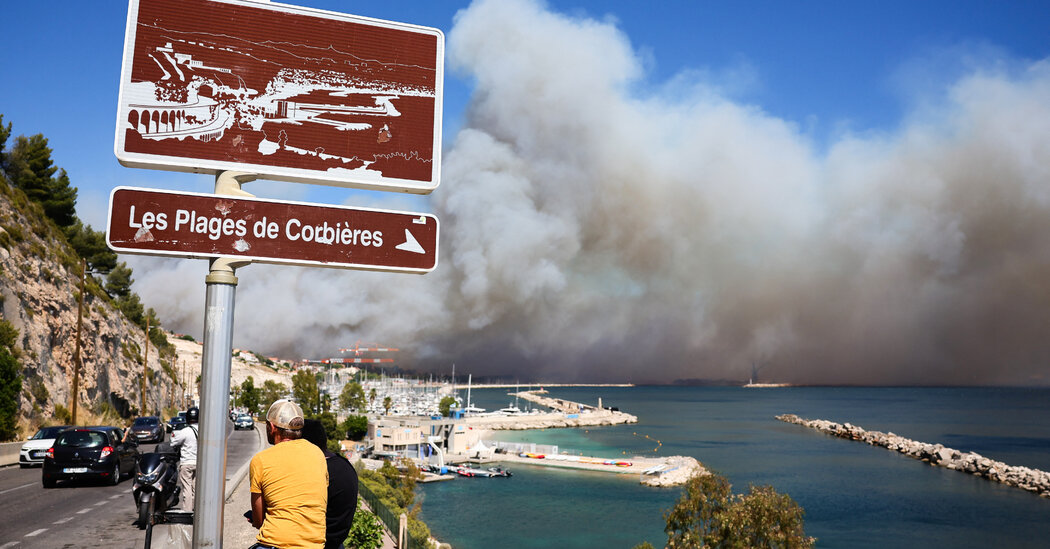Firefighters battled a fast-moving blaze on the outskirts of France’s second-largest city, Marseille, into the early hours of Wednesday, after the wildfire injured more than 100 people and prompted hundreds to evacuate.
The blaze was ignited by a car fire in Les Pennes-Mirabeau, a small community about eight miles north of Marseille. Whipped by powerful, erratic winds, the wildfire had spread to about 1,700 acres by late Tuesday, forcing the authorities to temporarily halt flights, suspend trains and close some roads.
France’s interior minister, Bruno Retailleau, flew to Marseille Tuesday night where he gave a news conference with the mayor and other officials. Mr. Retailleau said that at least 110 people had been injured, including at least 30 firefighters, as well as local and national police. He said it was “exceptional” that there were no deaths, given the intensity of the fire.
Mr. Retailleau said that firefighters would be battling the blaze all night. More than 600 volunteer and professional firefighters were involved, aided by 15 firefighting planes and helicopters, he said. At least 400 people had been ordered to evacuate and 14,000 were told to stay home, he said.
The Marseille-Provence Airport suspended flights on Tuesday because of the fire. It is one of France’s busiest airports, serving more than 11 million passengers last year. The airport said Tuesday evening that it would reopen at 9:30 p.m., but officials warned that flights could still be affected.
The fire erupted after a dayslong heat wave parched parts of Western Europe, turning woodlands into tinderboxes. The French weather agency had warned that there was also a high risk of forest fires elsewhere in the country, given the windy conditions.
Footage posted on social media appeared to show residents of Marseille trying to put out spot fires with buckets of water and tree branches. Other images from the area showed thick plumes of smoke rising high above the seaside city, which is a popular summer destination on the Mediterranean coast.
On Tuesday evening, city officials urged residents of Marseille “to limit their movements so as not to hinder rescue operations” and to avoid traveling on roads so that firefighters could operate freely. Residents nearest to the fire, on the outer edge of the city, were ordered to stay inside and close their shutters and doors.
More than 1,000 firefighters were battling another blaze near the city of Narbonne, also on France’s Mediterranean coast. Officials said on Tuesday that this fire had burned nearly 5,000 acres.
Across the border, Spain was also trying to control a large wildfire. The Catalonia regional authorities ordered residents in nearly a dozen towns and neighborhoods to remain in their homes as firefighters battled a blaze that the emergency services said had burned nearly 6,000 acres since Monday.
The heat wave has prompted weather warnings in several European countries. In Greece, temperatures rose above 40 Celsius, or 104 Fahrenheit, on Tuesday, prompting the authorities to restrict visiting hours to the Acropolis and issue wildfire warnings.
While tying a single heat wave to climate change requires extensive analysis, scientists have no doubt that heat waves around the world are becoming hotter, longer and more frequent. Last year was the hottest on record, according to the World Meteorological Organization.
Livia Albeck-Ripka is a Times reporter based in Los Angeles, covering breaking news, California and other subjects.
Andrés R. Martínez is a Times editor who leads a team in Seoul responsible for breaking news coverage.
The post Wildfire on Edge of Marseille Injures More Than 100, Officials Say appeared first on New York Times.




